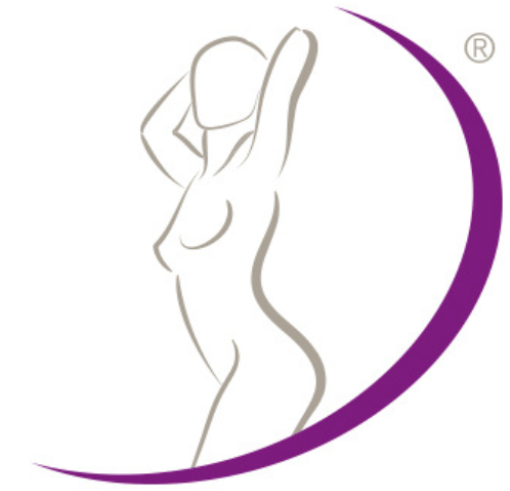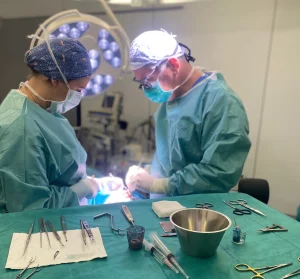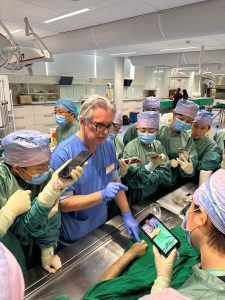Insider tips and questions you must ask when choosing a plastic surgeon
After much deliberation, you’ve decided to undergo a certain aesthetic treatment…
The next question is: Where and by whom will you be treated?
At first, you’ll have trouble seeing the forest for the trees, as a simple Google search will already give you so many possible results.
… How do you approach this?
How do you decide which doctor or clinic to choose for your treatment?
There are several factors to determine whether a particular plastic surgeon is suitable for you and your treatment. Below, we’re happy to share some concrete insider tips and questions to guide you in selecting a good plastic surgeon:
1. Is this doctor a real plastic surgeon?
Always check first what the professional title and training of your practitioner is.
Are you dealing with a “Plastic Surgeon” or a “Cosmetic/Aesthetic Doctor/Surgeon”? In another blog, we explain the difference between a plastic surgeon and a cosmetic or aesthetic doctor. This is an important first indication to know if your doctor has the required training to perform this aesthetic procedure.
A true Plastic Surgeon is recognized by a RIZIV number that ends in 210. You can check the RIZIV number via this link. You can also search by name on the European website Real Plastic Surgeon.
2. What experience does this plastic surgeon have, specifically for my treatment?
Look for a plastic surgeon with substantial relevant experience in the specific procedure you’re interested in. Experienced plastic surgeons usually have a sub-specialization within plastic surgery, such as aesthetic plastic surgery (e.g., nose surgeries, breast augmentations…) or reconstructive plastic surgery (e.g., burn injuries).
Also, check if your plastic surgeon is just starting their career or has built years of experience and a strong reputation.
3. Does this plastic surgeon keep up with continuous education to stay updated on medical developments?
Does your plastic surgeon attend ongoing medical courses and conferences on the field and treatment you want to undergo? Or are they “stuck in their ways” and unwilling to keep up with the many advancements in the sector?
Carefully read the practitioner’s or clinic’s website. Here you will often find valuable information about their education, specialization, and experience, how long they’ve been active, the continuing education and conferences they attend, before-and-after photos of treatments in which they’re specialized, and more…
4. Are there certifications or seals for plastic surgery?
Membership in certain recognized professional organizations can be seen as a seal of approval for plastic surgeons.
We recommend checking the following:
• RBSPS (Royal Belgian Society for Plastic Surgery): Since 1955, this is the main professional organization for Belgian Plastic Surgeons. Its Dutch counterpart is the NVPC (Dutch Society for Plastic Surgeons).
• ISAPS (International Society of Aesthetic Plastic Surgery): Founded in 1970, this international organization of aesthetic plastic surgeons represents about 1,500 plastic surgeons worldwide and organizes several conferences. You can only become a member by invitation and after an extensive screening.
• American Society of Plastic Surgeons (ASPS): Founded in 1931, this is the largest professional organization for plastic surgery in the world.
Membership in such organizations provides not only the opportunity for continuous education and training but also valuable connections with fellow surgeons for consultation on treatments.
5. Avoid “large chain” clinics
More and more large private clinics are emerging that operate as chains, with multiple locations, many employed doctors, and often very low prices.
These clinics are often commercially driven, usually by people without a medical background. As a result, you often encounter (temporarily) hired doctors who are either early in their careers and gaining experience before opening their own practice, or doctors with less strong reputations who haven’t been able to establish their own practices.
This is comparable to the difference between a budget hotel, where the service and accommodations are simple and impersonal, and a boutique hotel, where the owner passionately provides a personal and high-quality experience.
6. What references can I find about this plastic surgeon?
In a sector where many people prefer to keep their aesthetic procedures private (especially in Belgium), it can be difficult to get a word-of-mouth recommendation.
That’s why it’s helpful to read online reviews and testimonials from other patients.
Read both the positive and negative reviews about a particular clinic and practitioner. Do this with a healthy dose of skepticism and filter reviews as you would with other online reviews. Pay attention to how the clinic responds to negative reviews.
Possible sources of reviews for plastic surgery include:
• Google: search “doctor’s or clinic’s name + reviews,”
• Facebook page of the doctor or clinic,
• Medical online booking systems like Doctena,
• forums,
• The clinic’s website (for positive reviews😊).
7. Schedule consultations with multiple plastic surgeons and compare who you feel the best connection with.
Make appointments with all the clinics or doctors on your shortlist. Only by visiting in person can you discover which plastic surgeon you feel the best connection with.
In addition, during a visit, you’ll get a better sense of the atmosphere and approach of the clinic than you could online.
Ultimately, it’s very personal with whom you feel the best connection. Even if you undergo the exact same procedure as your neighbor, it might be that you don’t connect with her surgeon. It’s a very individual experience, so what feels right for someone else might not be the right choice for you, and vice versa.
8. First impression
“There’s only one chance to make a good first impression“
You want to be sure you’ll be well taken care of, so first impressions matter a lot.
- Do I feel welcome?
- Is everyone friendly?
- Do they take the time for me and my (even seemingly trivial) questions?
- Do I trust these people?
9. Open communication
Choose a surgeon with whom you have open and comfortable communication. The surgeon should be willing to answer all your questions and address any concerns or fears, both before and after your treatment.
10. A plastic surgeon may also refuse a procedure
Don’t be disappointed if a plastic surgeon advises against the procedure you have planned.
You might even be glad that the surgeon does not agree to perform the treatment hastily. This could save you a lot of money and disappointment.
A good plastic surgeon will also not hesitate to refer you to another specialist if they have more experience or are better suited for the procedure you want.
11. Choose a plastic surgeon whose results you like.
Everyone has different tastes, so it’s not enough to just trust a recommendation from a friend or acquaintance. It’s important to assess the results of a particular surgeon and see if they align with your aesthetic preferences.
During the consultation, you can do this by looking at before-and-after photos and clearly indicating what you like or dislike.
It’s also important that these photos are well-filtered by the surgeon, so that they are comparable to your body type, age, etc. Otherwise, you may compare yourself to the wrong examples, leading to unrealistic expectations.
12. Location and facilities
Research the clinic’s location and the facilities they offer, such as cleanliness and safety, and whether the clinic is equipped with the latest technologies and equipment.
- Are procedures performed in an accredited surgical facility?
Even if a procedure is considered standard, it’s important to check whether the clinic has a fully equipped surgical facility.
For private clinics in Belgium, you can check if they have the BSPC (Belgian Society for Private Clinics) certification. This certification stands for the top of Belgian private clinics in aesthetic plastic surgery. - Also, it’s crucial to know if an experienced anesthesiologist is present, or if only sedation (sleep anesthesia) is offered. For certain procedures, the presence of an experienced anesthesiologist is absolutely essential.
13. Price and costs
It’s important to know the price of the treatment and understand which costs are included and which are not.
However, don’t let price be the only factor in your decision, because the quality of care and the end result are much more important.
With a strikingly low price, there is often a catch, such as the use of lower-quality implants or a less experienced surgeon.
14. Post-operative care
Also check whether the plastic surgeon has a clear plan for your post-operative care, including follow-up appointments and aftercare.
- Will my plastic surgeon or the clinic be easily accessible in case of a post-operative problem?
- Will my plastic surgeon still be working at the clinic where the surgery took place, or is it a large private clinic or chain with a high turnover of doctors? In the latter case, you may end up with a colleague, but this is often not the same, as no one likes to take over complications from another.
15. Red flags
Lastly, we provide some “red flags” to look out for—specific things that may indicate you should avoid a particular plastic surgeon or clinic:
- Poor phone or online availability (e.g., no website).
- Unfriendly staff.
- You don’t meet the treating doctor during the consultation or you’re assigned a different doctor during the procedure than the one you met during the consultation.
- You’re not given time to think or can have the treatment done within a week. Don’t let yourself be pressured into booking quickly, even if it’s due to a time-limited price offer. This is not the right moment to make hasty decisions. Your body and health are too important for compromises. Plastic surgery can be a positive, life-changing experience, but it shouldn’t be rushed. Experienced plastic surgeons understand this and won’t pressure you to make a quick decision or push a treatment before you’re 100% ready. Take your time, visit other clinics, and inform yourself… before making your decision. If needed, make a second consultation appointment with the same surgeon. For some procedures, Dr. Nelissen even requires this before proceeding with treatment.
- You don’t receive a clear treatment proposal with the details of your procedure (e.g., the size of the implant or the number of cc’s for a breast augmentation, or the material used in injectables).
- You don’t receive a clear price quote for the treatment, including the cost of the surgical facility, anesthesia, etc. Be sure to check if VAT is included for aesthetic procedures.
- You don’t get a 24/7 post-operative contact number.
16. The right professional
When you’re hiring someone to do renovations on your house, you look for a contractor with the right specialization and check out their (online) reviews. In other words, you look for the “right professional for the job”.
Why would you be less critical when choosing the right specialist for your own body? Just like in the construction industry, there are unfortunately many unqualified practices in our field, who mislead people through smooth sales talk.
Especially for aesthetic treatments, it’s crucial that you do your research about who will treat you. The demand for aesthetic procedures has grown quickly over the past 10 years, attracting not only doctors without the proper specialization but even non-doctors.
And yet, we still see this far too often in our practice. People come for a second opinion or for a “re-do” (corrective treatment) after they didn’t thoroughly research their practitioner’s training and experience the first time around, and now they’re too embarrassed to go back to the same practitioner.
We hope these tips can help you find the ideal plastic surgeon.
We’ve already found ours 😊.
Do you have any questions?
Would you like to discuss whether this treatment could be right for you?
Then make your non-binding appointment for a consultation at our clinic.



